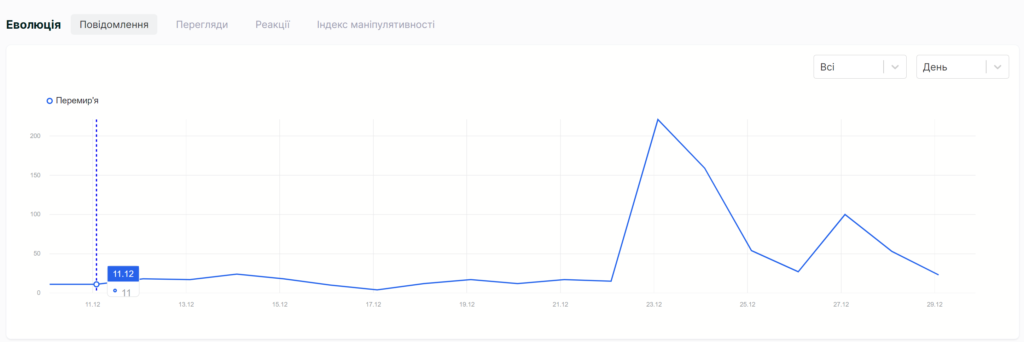On December 23, 2023, an article in The New York Times entitled “Putin Quietly Signals He Is Open to a Cease-Fire in Ukraine” became an information bomb, in which the main thesis was that Russia was allegedly ready for substantive negotiations on a ceasefire. This information fell on prepared ground out of disappointment in the small success of the Ukrainian counteroffensive, problems with mobilization, the recognition by the Commander-in-Chief of the Armed Forces of Ukraine that “the war has reached a dead end,” and so on.
Our team investigated how this narrative was spread in the Ukrainian information space and who was fueling it, and came up with some interesting findings that we want to share with you.
The tracking started on December 10, 2023 and continues as of December 29. An AI-based narrative tracking system was used to monitor the tracking. Conducted by. by the research and analytical group InfoLight.UA (NGO Foundation for the Promotion of Democracy) as part of its efforts to counter Russian disinformation and information and psychological operations.
Chronology of betrayal
The start of this campaign can be considered the statement of blogger Karl Volokhon December 21 on the Pryamyy TV channel:
“Ukraine has long been ‘stagnant’ and has no chance of a serious breakthrough in the coming years.
Hopes for any serious recovery of Ukraine are also being pushed back. The situation in the world is not changing in our favor, and it may even get worse. I don’t understand how in this situation you can’t change your strategy. It became very profitable for some people to keep the war going, because when the ceasefire is signed, elections will have to be held, and obviously, they will lose the elections, after which there will be very serious legal issues…
I am very sorry that people continue to die because some people do not want to look for other ways out of the situation.”
This statement began the active promotion of these theses in the information space. The primary sources were subsequently foreign media, the information from which was disseminated in Ukraine.
Also on December 21, a series of publications appeared with reference to the “American Stimson Center” and “well-known American experts – Samuel Charap, senior political scientist at the Rand Corporation (which, among other things, analyzes for the Pentagon) and Jeremy Shapiro, director of research at the European Council on Foreign Relations“, which stated that “…at the first stage, Ukraine and Russia could agree on a ceasefire, disengagement of troops and a contact group to monitor the agreements…”
Karl Volokh ‘s post was widely circulated and discussed, with the most active dissemination on all possible platforms by the fugitive blogger Andriy Serebryansky (Luhansk). Which is now one of the most popular in terms of reaching public opponents of mobilization events in Ukraine.
The main narrative disseminated and discussed is “Volodymyr Zelenskyi and Andriy Yermak do not want a truce because they will be criminally liable after losing the election.”


OnDecember 22, Der Spiegel publishes an article “Delicate Russian Dinner at German Ambassador’s House”, which refers to a “secret ‘Russian dinner’ at the German Embassy in Washington in late October, during which the closest aide to German Chancellor Olaf Scholz, Chief of Staff Wolfgang Schmidt, reportedly “euphorically praised” a proposal by a representative of the American think tank Samuel Charap to end the war in Ukraine through an imposed settlement negotiated with Moscow.”
On December 23 , the main article appears in The New York Times, “Putin Quietly Signals He’s Open to Ceasefire in Ukraine.”
The main thesis: Since at least September, President of the aggressor country Vladimir Putin has been sending signals through intermediaries that he is ready for a ceasefire in the war of aggression against Ukraine, which would include a freeze in hostilities on the current contact line.
The actual continuation/support of the narrative is provided by the publication (on December 23) with reference to Italian Defense Minister Guido Crozetto, who stated that “along with military support for Ukraine, it is time to start looking for a political solution to end the war caused by Russia’s invasion.”
Also on December 23, POLITICO publishes “Ukraine’s Ambassador Denies German Pressure on Peace Talks with Russia,” in which “Ukraine’s ambassador to Germany on Saturday rejected claims that Berlin may be pressuring Kyiv behind closed doors to reach a peace deal with Russia.”
OnDecember 23, the BILD in Russian telegram channel republishes its December 14 story, which states that “Putin will allegedly attack Europe in the winter of 2024 or 2025.” This information is actively disseminated by the Ukrainian media and social networks.
Important: The publication is repeated, published on the Russian-language telegram channel of the publication and reinforces negative expectations from the continuation of the war!
On December 24, another fugitive blogger, Myroslav Oleshko, posts that “Freezing the fighting along the front line is the most realistic option for ending the war in Ukraine.” In which he refers to the CNN article of December 22, “Ukraine’s path to victory lies through the streets of Moscow,” where this is one of the likely scenarios.
On December 24, as a separate news item, there were also publications that “Russian ‘oppositionist’ and Yabloko party leader Grigory Yavlinsky says he had a meeting with Russian dictator Vladimir Putin, during which he tried to persuade him to negotiate. He said this in a commentary for a resonant article in The New York Times”.
After the Defense Intelligence of Ukraine commented on The New York Times article that “Ukraine is certainly interested in the end of this genocidal war, but with the restoration of our territorial integrity and punishment of the criminals,” attention to the topic began to drop significantly.

However, on December 27, the topic was again brought to the forefront with the publication in Der Spiegel of a statement by Saxon Prime Minister Michael Kretschmer, who “calls on the federal government to use more diplomacy instead of simply supplying weapons to resolve Russia’s war of aggression against Ukraine.”
There is an obvious coordinated media attack on Ukraine aimed at manipulating public sentiment, increasing panic, and forcing capitulation on Russia’s terms. Not only foreign media, but also Ukrainian public figures are actively involved in this information and psychological operation. At the very least, they act in sync and in coordination with the appearance of publications in foreign media and duplicate Russian disinformation narratives.
The main theses that are being disseminated:
- The war is “stagnant” and leads to unnecessary casualties
- We need to negotiate with Russia and establish a ceasefire.
- It is impossible to win the war in Russia
- Volodymyr Zelenskyy and Andriy Yermak do not want peace because they will lose power in the re-election and be punished for treason.
- In March 2022, agreements were signed on favorable terms for Ukraine, but Zelenskyy and Yermak disobeyed because of pressure from Boris Johnson.
We continue to monitor the spread and all those involved.


Leave a Reply